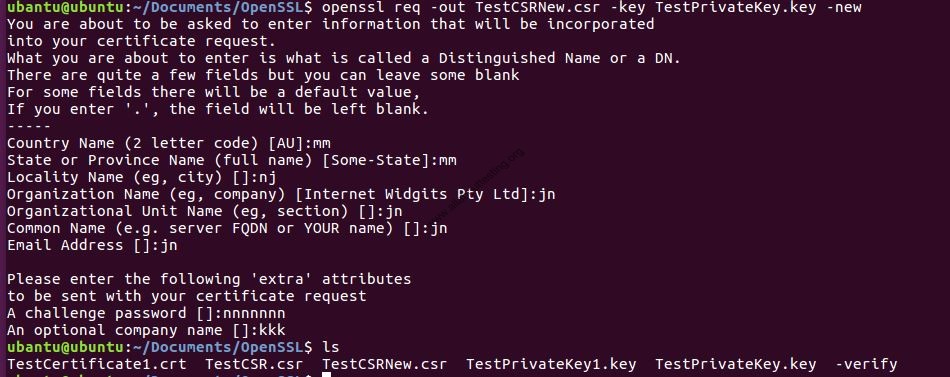Openssl Generate From Csr Seperate Private Key File
Exporting Certificates from the Windows Certificate Store describes how to export a certificate and private key into a single.pfx file. Follow the procedure below to extract separate certificate and private key files from the.pfx file. Take the file you exported (e.g. Certname.pfx) and copy it to a system where you have OpenSSL installed. I am using the following command in order to generate a CSR together with a private key by using OpenSSL: openssl req -new -subj '/CN=sample.myhost.com' -out newcsr.csr -nodes -sha512 -newkey rsa:2048 It generates two files: newcsr.csr; privkey.pem; The generated private key has no password: how can I add one during the generation process? This will fire up OpenSSL, instruct it to generate a certificate signing request, and let it know to use a key we are going to specify – the one we just created, in fact. Note that a certificate signing request always has a file name ending in.csr.
- Openssl Generate From Csr Separate Private Key File Extension
- Extract Private Key Openssl
- Openssl Generate Key From Csr
Here are the steps you’ll take to generate a CSR using the OpenSSL application tool: Step 1: Install OpenSSL on your Windows PC. Step 2: OpenSSL Configuration Steps. Step 3: Generate the CSR Code. OpenSSL generates the private key and CSR files. If you typed the command in step 2 exactly as shown, the files are named server.key and server.csr. You can now send the text in the server.csr file to the signing authority to obtain your certificate. (Do not send the information in your private key!). Jan 08, 2017 This is likely more for myself than anyone else, because I’ve had to create so many KEY and CSR files recently for all sorts of third party devices and appliances. Assuming you have access to a Linux server with OpenSSL you can easily and quickly generate the private key and certificate request with very little hassle.
Openssl Generate From Csr Separate Private Key File Extension
One of the most versatile SSL tools is OpenSSL which is an open source implementation of the SSL protocol. There are versions of OpenSSL for nearly every platform, including Windows, Linux, and Mac OS X. OpenSSL is commonly used to create the CSR and private key for many different platforms, including Apache. However, it also has hundreds of different functions that allow you to view the details of a CSR or certificate, compare an MD5 hash of the certificate and private key (to make sure they match), verify that a certificate is installed properly on any website, and convert the certificate to a different format. /generate-new-ssh-key-pair.html. A compiled version of OpenSSL for Windows can be found here.
If you don't want to bother with OpenSSL, you can do many of the same things with our SSL Certificate Tools. Below, we have listed the most common OpenSSL commands and their usage:
General OpenSSL Commands
These commands allow you to generate CSRs, Certificates, Private Keys and do other miscellaneous tasks.
- Generate a new private key and Certificate Signing Request
- Generate a self-signed certificate (see How to Create and Install an Apache Self Signed Certificate for more info)
- Generate a certificate signing request (CSR) for an existing private key
- Generate a certificate signing request based on an existing certificate
- Remove a passphrase from a private key
Checking Using OpenSSL
If you need to check the information within a Certificate, CSR or Private Key, use these commands. You can also check CSRs and check certificates using our online tools.
- Check a Certificate Signing Request (CSR)
- Check a private key
- Check a certificate
- Check a PKCS#12 file (.pfx or .p12)
Debugging Using OpenSSL

If you are receiving an error that the private doesn't match the certificate or that a certificate that you installed to a site is not trusted, try one of these commands. If you are trying to verify that an SSL certificate is installed correctly, be sure to check out the SSL Checker. Smart notebook 16.2 product key generator.
- Check an MD5 hash of the public key to ensure that it matches with what is in a CSR or private key
- Check an SSL connection. All the certificates (including Intermediates) should be displayed
Converting Using OpenSSL

Extract Private Key Openssl
These commands allow you to convert certificates and keys to different formats to make them compatible with specific types of servers or software. For example, you can convert a normal PEM file that would work with Apache to a PFX (PKCS#12) file and use it with Tomcat or IIS. Use our SSL Converter to convert certificates without messing with OpenSSL.
- Convert a DER file (.crt .cer .der) to PEM
- Convert a PEM file to DER
- Convert a PKCS#12 file (.pfx .p12) containing a private key and certificates to PEM
You can add -nocerts to only output the private key or add -nokeys to only output the certificates.
- Convert a PEM certificate file and a private key to PKCS#12 (.pfx .p12)
Openssl Generate Key From Csr
Originally posted on Sun Jan 13, 2008